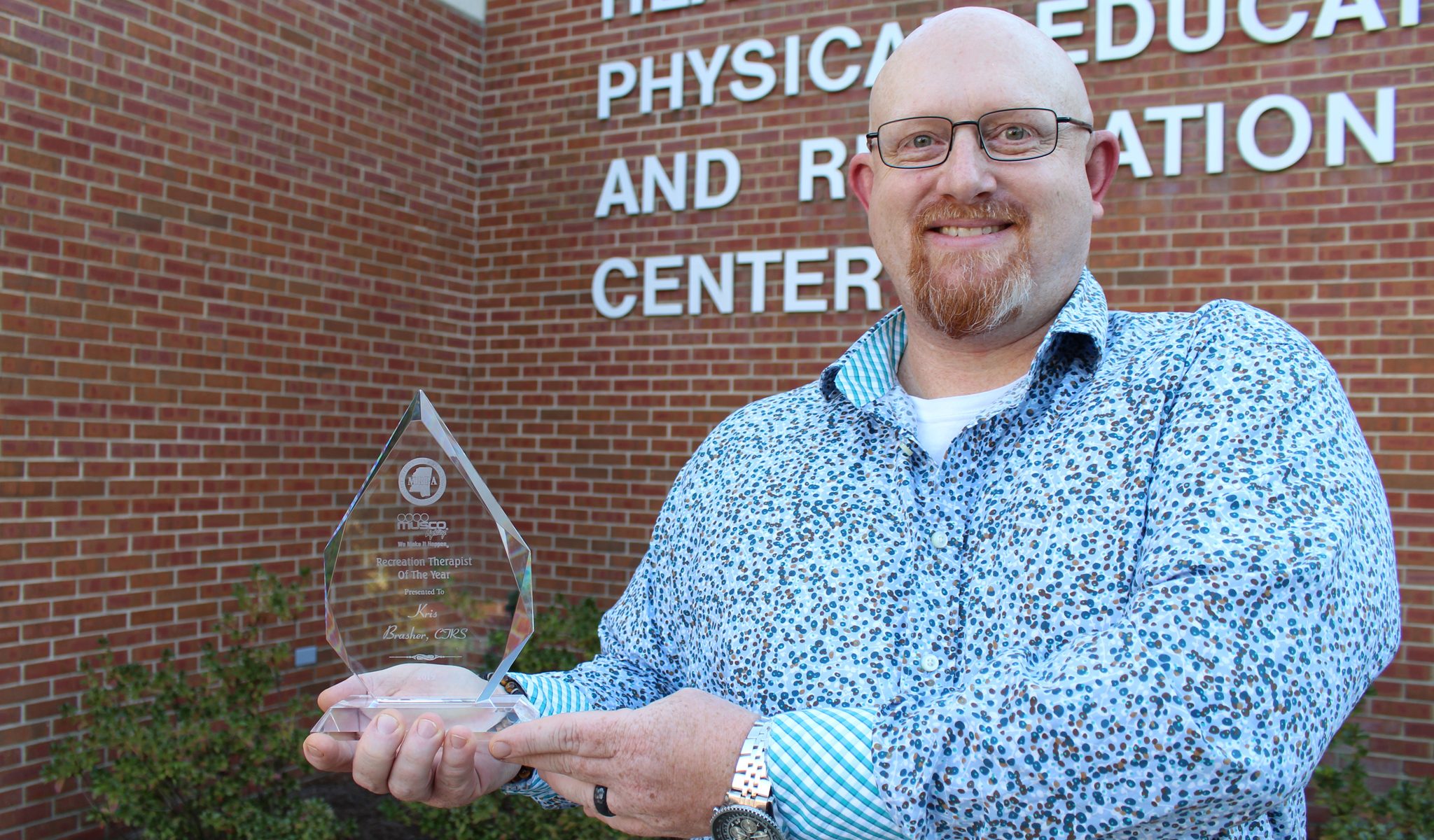
UM instructor Kris Brasher shows off his award as Recreation Therapist of the Year, presented by the Mississippi Recreation and Parks Association. Photo by Sarah Sapp/School of Applied Sciences
OXFORD, Miss. – Kris Brasher, instructor of therapeutic recreation and a certified therapeutic recreation specialist in the University of Mississippi‘s Department of Health, Exercise Science and Recreation, has been named Recreation Therapist of the Year by the Mississippi Recreation and Parks Association.
Roughly 300 registered certified therapeutic recreation specialists work in Mississippi, and Brasher was recognized as the best among his peers at the associations recent annual conference.
“I had no idea it was coming,” Brasher said. “It’s an award you have to be nominated for.
“(The organization) not only surprised me by calling me up for the award, but they also called my wife and kids and told them that I would be receiving it. They drove down to Biloxi from Oxford and surprised me at the conference.”
Brasher joined the department in the School of Applied Sciences this fall to help revamp curriculum for the new recreational therapy minor.
Therapeutic recreation uses recreation as a tool to enhance an individual’s quality of life cognitively, spiritually, physically or mentally through the use of activity-based processes Brasher said. The 21-hour recreational therapy minor is especially suitable for students majoring in degrees that emphasize major components of sport, recreation, health, therapy or rehabilitation, he said.
“An emphasis in recreational therapy is something we used to have several years back,” Brasher said. “I was able to teach some classes as an adjunct at that point. Now we are in the position where we can try to rebuild it.
“I want to make it a program where students will be placed once they graduate. I have done this for 20 years, so, it is something I truly believe in.”
The American Therapeutic Recreation Association outlines recreational therapy as a treatment service designed to restore, remediate and rehabilitate a person’s level of functioning and independence in life activities; to promote health and wellness; and to reduce or eliminate the activity limitations and restrictions to participation in life situations caused by an illness or disabling condition.
Certified therapeutic recreation specialists create individualized treatment plans for clients based on their strengths and deficits.
“As a recreation therapist you say, ‘What can I do; what activities will be most beneficial; what modifications will I need to make; what is the best choice?'” Brasher said. “Then you do that individually for each patient.”
The minor is ideal for students pursuing professions that require skills working with people who have special needs or disabilities, at-risk adolescents and older adults, he said.
“If you want to help people, it’s perfect,” Brasher said. “You can work in psychiatric facilities, correctional facilities, schools, nursing homes, retirement settings and facilities for individuals with developmental disabilities. There are so many options.
“Everyone, at any stage of life, can use recreational therapy.”
Students in this minor will take 21 hours of recreational therapy, which includes 15 hours of core classes. They also will choose seven hours of classes from a pre-approved list.
“Kris Brasher is an excellent addition to the HESRM faculty and instantly established his expertise with this Recreation Therapist of the Year recognition,” said Kim Beason, coordinator of sport and recreation administration.
“He will support the mission of the sport and recreation degree programs to build contemporary evidence-based and vocation-focused education programs for both majors in HESRM and minors within associated fields for careers upon graduation.”
The minor qualifies students majoring in sport and recreation to become certified therapeutic recreation specialists. It also allows students majoring in programs such as gerontology, education, criminal justice and exercise science to augment their education to compete for a variety of positions in public, private and not-for-profit organizations.
The minor in recreation therapy also prepares graduates to earn a Master in Sport and Recreation Administration, which allows them to further specialize for careers that work with diverse populations.
Acceptance into the recreational therapy minor is competitive and those interested in applying for the minor should visit https://www.surveymonkey.com/r/RT_2019. For more information about sport and recreation administration, visit http://hesrm.olemiss.edu/.
The School of Applied Sciences, home to the Department of Health, Exercise Science and Recreation Management, offers professional preparation programs that integrate academic study, clinical training, creative research, service-learning and community outreach, leading to the development of leaders whose professional endeavors will improve health and well-being.